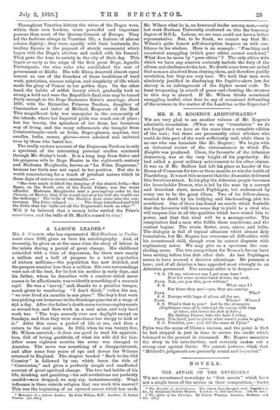A LABOUR LEADER.*
Mn. J. WiLsoN, who has represented Mid-Durham in Parlia- ment since 1890, gives us here his autobiography. And, of necessity, he gives us at the same time the story of labour in the mines during a period of great change. His childhood coincided with a time of depression, for there were nearly a million and a half of paupers to a total population of sixteen millions,—the population has now doubled, and the paupers number less than a million. His own surroundings were not of the best, for he lost his mother in early days, and his father, whom he describes with a candour which never ceases to be affectionate, was evidently something of a inauvais sujet. He was a "navvy," and, thanks to a peculiar temper, much given to wandering. "I don't think," mites the son, " we ever lived six months in one place." The boy's first work was picking out ironstone in the Stanhope quarries at a wage of 4/d. a day. After the father's death came various employments as errand-boy, and then work in a -coal mine, and very hard work. too. " The boys scarcely ever saw daylight except on Sundays, and then they were sometimes too sleepy to look at it." After this came a period of life at sea, and then a return to the coal mine. In 1862, when he was twenty-five, Mr. Wilson married,—it does one good to read his apprecia- tion, full of loving gratitude, of what his wife did for him. After some eighteen months the scene was changed to America. The move was something of a disappointment, and after some four years of ups and downs the Wilsons returned to England. The chapter headed " Back to the Old Country" is followed by one which bears the title of " Conversion," and gives a perfectly simple and unaffected account of great spiritual change. The two bad habits of his life, drinking and gambling—his self-revelations are perfectly candid—were dropped, we may say, instantaneously. What influence is there outside religion that can work this marvel This was the beginning of an upward career which has made • Memories of a Labour Leader. By John Wilson, M.P. London: T. Fisher Unwin. [Cs. net.]
Mr. Wilson what he is, an honoured leader among men,—only last week Durham University conferred on him the honorary degree of D.C.L. Labour, we are sure, could not have a better representative. But, to be frank, we cannot say that Mr. Wilson's quite honest self-description inspires us with con- fidence in his wisdom. Here is an example : " Poaching and occasional smuggling (which pure ethics cannot oondemn)." What does he mean by " pure ethics " P The only ethics with which we have any concern certainly include the duty of the citizen and obedience to the law. No doubt some laws are so bad that men are absolved from obeying them, and therefore justify revolution, but they are very rare. We hold that men were absolutely justified in disobeying the fugitive-slave law, for slavery is an infringement of the higher moral code. To treat trespassing in search of game and cheating the revenue in this way is absurd. If Mr. Wilson thinks occasional smuggling lawful, what does he say of occasional defrauding of the revenue in the matter of the Land-tax or the Super-tax


















































 Previous page
Previous page